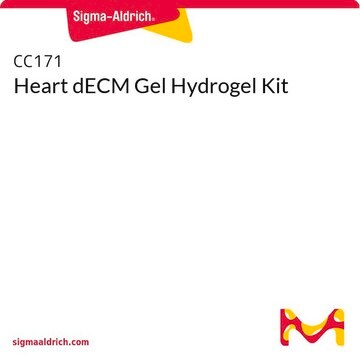Recommended Products
biological source
Porcine
packaging
pkg of 1 kit
manufacturer/tradename
Sigma-Aldrich
growth mode
N/A
technique(s)
cell culture | mammalian: suitable
shipped in
ambient
storage temp.
2-8°C
General description
Application
Features and Benefits
Storage and Stability
Disclaimer
signalword
Warning
hcodes
pcodes
Hazard Classifications
Met. Corr. 1
Storage Class
8A - Combustible corrosive hazardous materials
Certificates of Analysis (COA)
Search for Certificates of Analysis (COA) by entering the products Lot/Batch Number. Lot and Batch Numbers can be found on a product’s label following the words ‘Lot’ or ‘Batch’.
Already Own This Product?
Find documentation for the products that you have recently purchased in the Document Library.
Articles
Comparison of decellularized extracellular matrix (dECM) hydrogels to Matrigel® matrices for predictive 3D cell culture models
Hydrogela are the most widely used systems for 3D cell culture. Learn more about this technology (what are hydrogels? How to chose?)
Our team of scientists has experience in all areas of research including Life Science, Material Science, Chemical Synthesis, Chromatography, Analytical and many others.
Contact Technical Service









